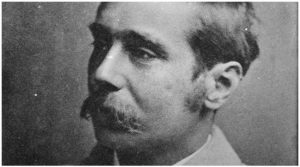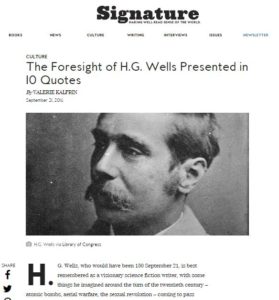
H.G. Wells, courtesy of the Library of Congress
By Valerie Kalfrin
Signature Reads, Sept. 21, 2016
H.G. Wells, who would have been 150 September 21, is best remembered as a visionary science fiction writer, with some things he imagined around the turn of the twentieth century – atomic bombs, aerial warfare, the sexual revolution – coming to pass years later. Yet Wells also advocated passionately for civil liberties and human rights, with statements that today seem as timely as ever.
The author of The Time Machine, The Island of Doctor Moreau, The Invisible Man, and The War of the Worlds continues to inspire storytellers in film and television. Kevin Williamson, creator of the TV hits Dawson’s Creek, The Following, and The Vampire Diaries, for instance, has a new series, Time After Time, scheduled to debut in 2017 about the time-travel adventures of a young Wells.
But Wells’s interests reached beyond what he called “scientific romances” with experiments and alien invasions. A socialist, Wells wrote often about class, government, religion, and race. Some consider his 1940 nonfiction book, The Rights of Man, partly written in response to World War II, the foundation for the 1948 United Nations Declaration of Human Rights, drafted after the author’s death in 1946. His other advocacy efforts included helping to form English PEN, a worldwide writers’ association that promotes freedom of expression and aims to remove barriers to literature.
Here are some of his progressive – some might say timeless – thoughts on respect, equality, and living well.
The Rights of Man, 1940
“Everyone, male or female, has the rights asserted in this Declaration. … Everyone is a joint inheritor of the world in its entirety, of earth and sea and of all that mankind has accumulated before his birth – knowledge, inventions, powers and possibilities. He is the child of mankind, and he has an equal right to food, covering, and medical care and to do all that he can do for the world from birth to death. Human beings differ among themselves very widely, but in the eyes of the law they are all equal to one another.”
The First Men in the Moon, 1901
“What is this spirit in man that urges him for ever to depart from happiness and security, to toil, to place himself in danger, to risk an even a reasonable certainty of death? It dawned upon me that there in the moon as a thing I ought always to have known, that man is not made to go about safe and comfortable and well fed and amused. … Against his interest, against his happiness, he is constantly being driven to do unreasonable things. Some force not himself impels him, and go he must.”
What Is Coming? 1916
“I hate and despise a shrewish suspicion of foreigners and foreign ways; a man who can look me in the face, laugh with me, speak truth and deal fairly, is my brother.”
The Wife of Sir Isaac Harman, 1914
“Moral indignation is jealousy with a halo.”
What Is Coming? 1916
“I do not believe that this invasion by women of a hundred employments hitherto closed to them is a temporary arrangement that will be reversed after the war. … The world after the war will have to adjust itself to this extension of women’s employment, and to this increase in the proportion of self-respecting, self-supporting women.”
The Discovery of the Future, 1901
“All this world is heavy with the promise of greater things, and a day will come, one day in the unending succession of days, when beings, beings who are now latent in our thoughts and hidden in our loins, shall stand upon this earth as one stands upon a footstool, and shall laugh and reach out their hands amid the stars.”
The Island of Dr. Moreau, 1896
“An animal may be ferocious and cunning enough, but it takes a real man to tell a lie.”
The Outline of History, 1920
“There are unhopeful prophets who see in the gathering together of men into one community the possibility of violent race conflicts, conflicts for “ascendancy,” but that is to suppose that civilization is incapable of adjustments by which men of different qualities and temperaments and appearances will live side by side, following different roles and contributing diverse gifts. The weaving of mankind into one community does not imply the creation of a homogeneous community, but rather the reverse; the welcome and the adequate utilization of distinctive quality in an atmosphere of understanding. … Communities all to one pattern, like boxes of toy soldiers, are things of the past rather than the future.”
First and Last Things: A Confession of Faith and Rule of Life,1908
“There is something harder to face than death, and that is the realization of failure and misdirected effort and wrong-doing. Faith is no Open Sesame to right-doing, much less is it the secret of success.”
The Time Machine, 1895
“‘It sounds plausible enough to-night,’ said the Medical Man; ‘but wait until to-morrow. Wait for the common sense of the morning.’”

